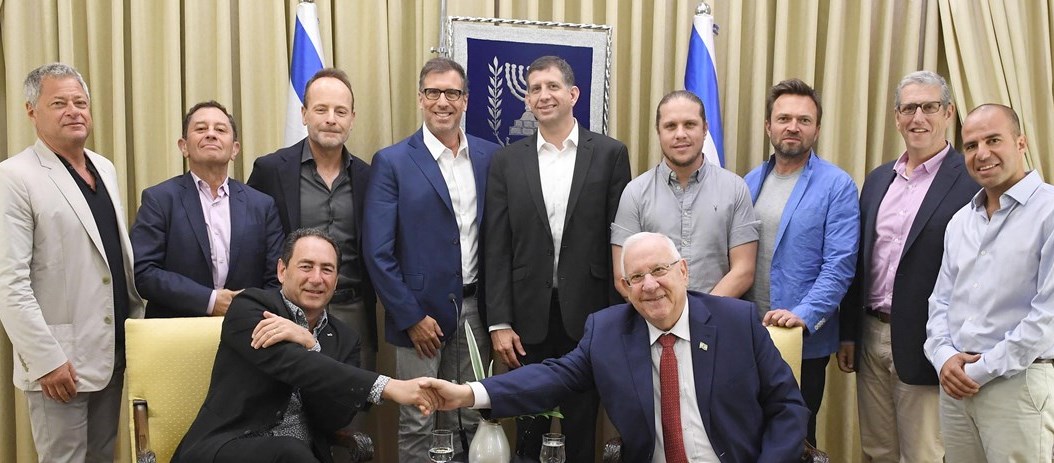Why are Israeli TV formats like “In Treatment,” “Homeland” and “Fauda” extremely successful in the United States? It’s all about the characters, says Adam Berkowitz, co-head of the television department at Creative Artists Agency (CAA) in Los Angeles and president of the international TV Formats Conference held September 12-14 in Tel Aviv.
“In Israel there isn’t a lot of money to do expensive action or adventure shows, so instead there is a focus on characters, and it’s the compelling characters that draw you,” Berkowitz tells ISRAEL21c.
“These are characters who deal with complex issues, and because Israel is a Western society those issues resonate with American viewers. For example, look at ‘In Treatment.’ They didn’t write new scripts for the American version but just translated the scripts from Hebrew to English and it worked. So, obviously a lot of Israelis are talking about the same things with their therapists as Americans do,” he points out.
Among other cross-continental deals Berkowitz has facilitated, he sold “Fauda” to global streaming site Netflix. The award-winning series about a counterterrorism undercover unit has aired in the US since November 2016 in the original Hebrew and Arabic with English subtitles.
When Berkowitz received eight subtitled episodes of Ananey Communications’ popular teen drama “Ha-Hamama” (“The Greenhouse”) written by Giora Chamizer, he thought it could translate well into English and would be perfect for Netflix.
“We set up a meeting with Netflix and they paired Giora with a person who knows Israeli TV,” says Berkowitz. “They signed for 25 episodes – two seasons so far.”
Chamizer was hired to write and produce the US version, “Greenhouse Academy,” which premiered on Netflix on September 8.
Though “Greenhouse Academy” is just the latest in a long string of Israeli TV formats adapted by Hollywood, it is the first to have been shot entirely in Israel. While the 12 main characters in the series are American, one main character is Israeli, and about 40 other Israeli actors appear in the show.
The mixed cast is a point of pride for Berkowitz, who’s been in the business more than 30 years and is one of the Israeli television industry’s main boosters in the US.
“About 12 actors were in Israel for several months so they got to see how special Israel is,” Berkowitz tells ISRAEL21c. “The setting is supposed to be San Diego and it looks great. It has the look of a very expensive show but it wasn’t because it’s cheaper to make a show in Israel.” The actors worked on beaches, streets and backlot studios.
Berkowitz expects that this successful experiment will open the door to additional TV shows to be produced in Israel for an American audience.
Berkowitz wants to spread the love beyond the US, however. That was one impetus for his founding the TV Formats Conference last year.
“Everyone in the United States knows Israeli formats are great, but I want to bring them to the rest of the world,” says Berkowitz, “and I want to bring people to Tel Aviv to see how great it is.”
He seems to have achieved this goal. The second annual conference drew buyers and producers from 28 countries. “They got to see professional presentations and meet with the movers and shakers of Israeli TV,” Berkowitz says.
They also got a peek at upcoming Israeli television shows to be showcased at MIPCOM, a major entertainment content market taking place October 16 to 19 in Cannes. At MIPCOM, the Israelis will be among many others competing for attention, while the Tel Aviv event put them squarely in the spotlight.
Other attendees and/or speakers at the event were Larry Tanz, vice president of content acquisition for the Netflix global service; FX Network General Manager John Landgraf; Gaumont International Television Vice CEO Christophe Riandee; Michael Rotenberg, cofounder and partner at 3 Arts Entertainment; Michael Schmidt, chief creative officer of Red Arrow Entertainment Group; Telemundo Executive Vice President Ricardo Coeto; former Viacom president Doug Herzog; Propagate Content co-CEO Ben Silverman; CAA talent agent Daniel Grover; and screenwriter-directors Richard LaGravenese and Gary Alazraki.

President Reuven Rivlin welcomed the Hollywood delegation led by Berkowitz at his official residence in Jerusalem on September 10.
“For many years we have been watching your shows, and now you are also watching Israeli shows. We even have Israeli superheroes,” said Rivlin, referring to “Wonder Woman” Gal Gadot.
Berkowitz spoke of his appreciation for the growing cooperation between the Israeli and international entertainment industries.
“I love Israel; it’s my passion,” he says. “This is my way of giving back. It’s my mitzvah [good deed] and it’s a good business model because the shows are really good. I want to keep selling more formats and producing more content in Israel.”

















